Complete Solutions to Conceptual Problems of chapter PROPERTIES OF BULK MATTER of Class 11 book with complete answers and questions
| Class 11 | PHYSICS |
| Chapter | PROPERTIES OF BULK MATTER |
| PRADEEP | Conceptual Problems |
| Number Of Questions | 100 |
| Academic Year | 2023-24 |
Which one is more elastic rubber or steel? Explain.
View SolutionA wire stretches by a certain amount under a load. If the load and radius are increased to four times, find the stretch caused in the wire.
View SolutionThe maximum load that a wire can sustain is W. If the wire is cut to half its value, the maximum load it can sustain is
View SolutionWhy is a spring made of steel, not of copper?
View SolutionA wire of length l and radius r has a weight W and the Young's modulus of elasticity Y. it is suspended vertically from a fixed point. Calculate the increase in length of wire porduced due to its own weight.
View SolutionThe density of a metal at normal pressure is `rho`. Its density when it is subjected to an excess pressure p is `rho'` . If B is the bluk modulus of the metal, then find the ratio `rho'//rho`.
View SolutionIf F is the breaking force of a wire, what will be the breaking force for (a) two parallel wires of the same size (b) for a single wire of double the thickness?
View SolutionA uniform pressure P is exerted by an external agent on all sides of a solid cube at temperature `t^(@)C`. By what amount should the temperature of the cube be raised in order to bring its volume back to its original volume before the pressure was applied if the bulk modulus is B and co-efficient of volumetric expansion is `gamma`?
View SolutionThe stress strain graph for a metal wire is shown in the fig. Upto the point E, the wire returns to its original state O along the curve EPO, when it is gradually unloaded. Point B corresponds to the fracture of the wire. (a) Upto what point on the curve is Hooke's law obeyed? (this point some times called proportional limits).
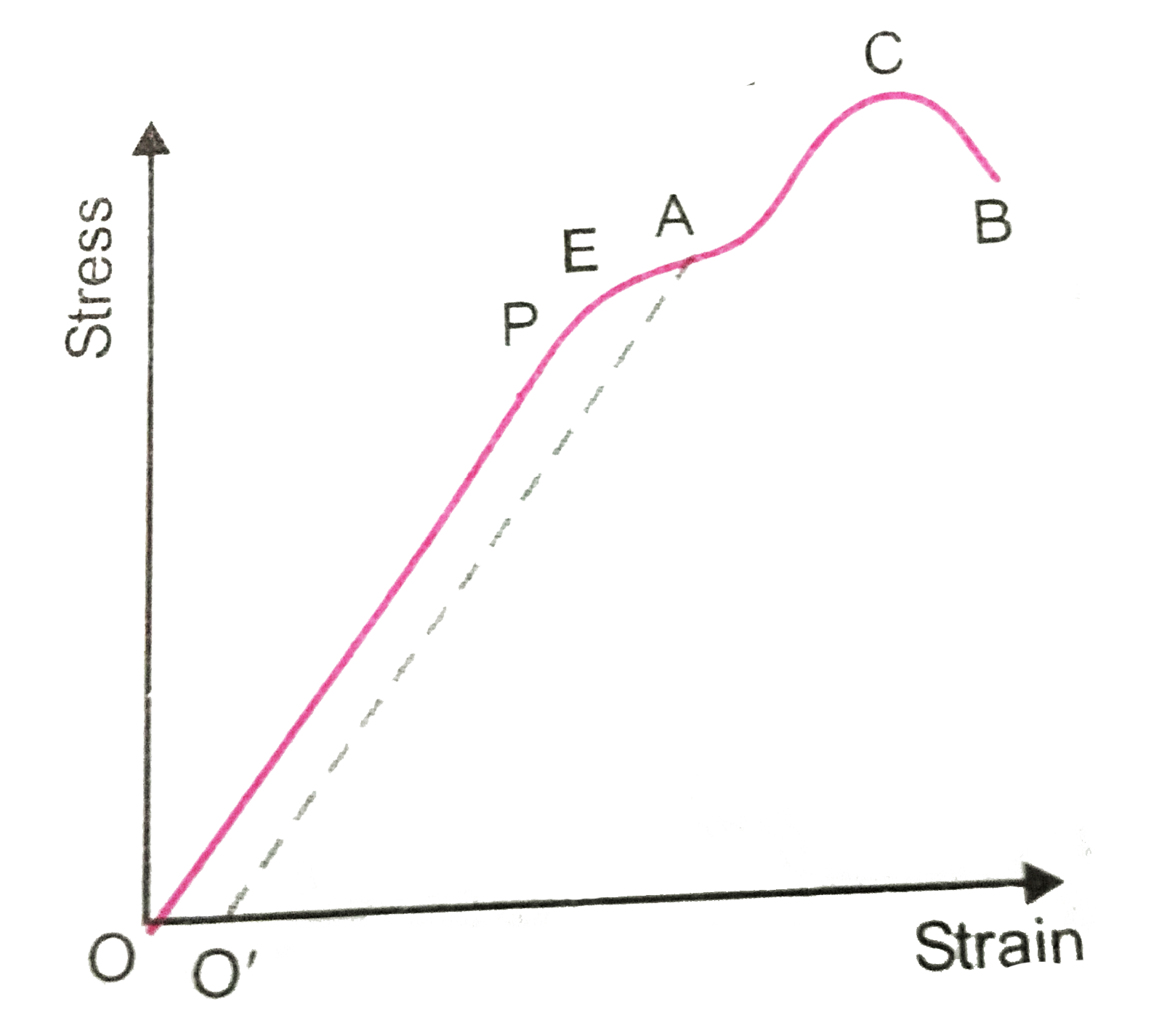
(b) Which point on the curve corresponding to elastic limet or yield point of the wire?
(c ) Indicate teh elastice and plastic regions of the stree-strain graph.
(d) Describe what happens when the wire is loaded upto a stress corresponding to the point A on the graph and then unloaded gradulally. In particular explain the dotted curve.
(e) Wht is peculiar about the protion of the stree- strain graph from C to B? Upto what stress can the wire be subjected with out causing fracture?
View SolutionTwo different types of rubber are found to have the stree-strain curves shown in fig.
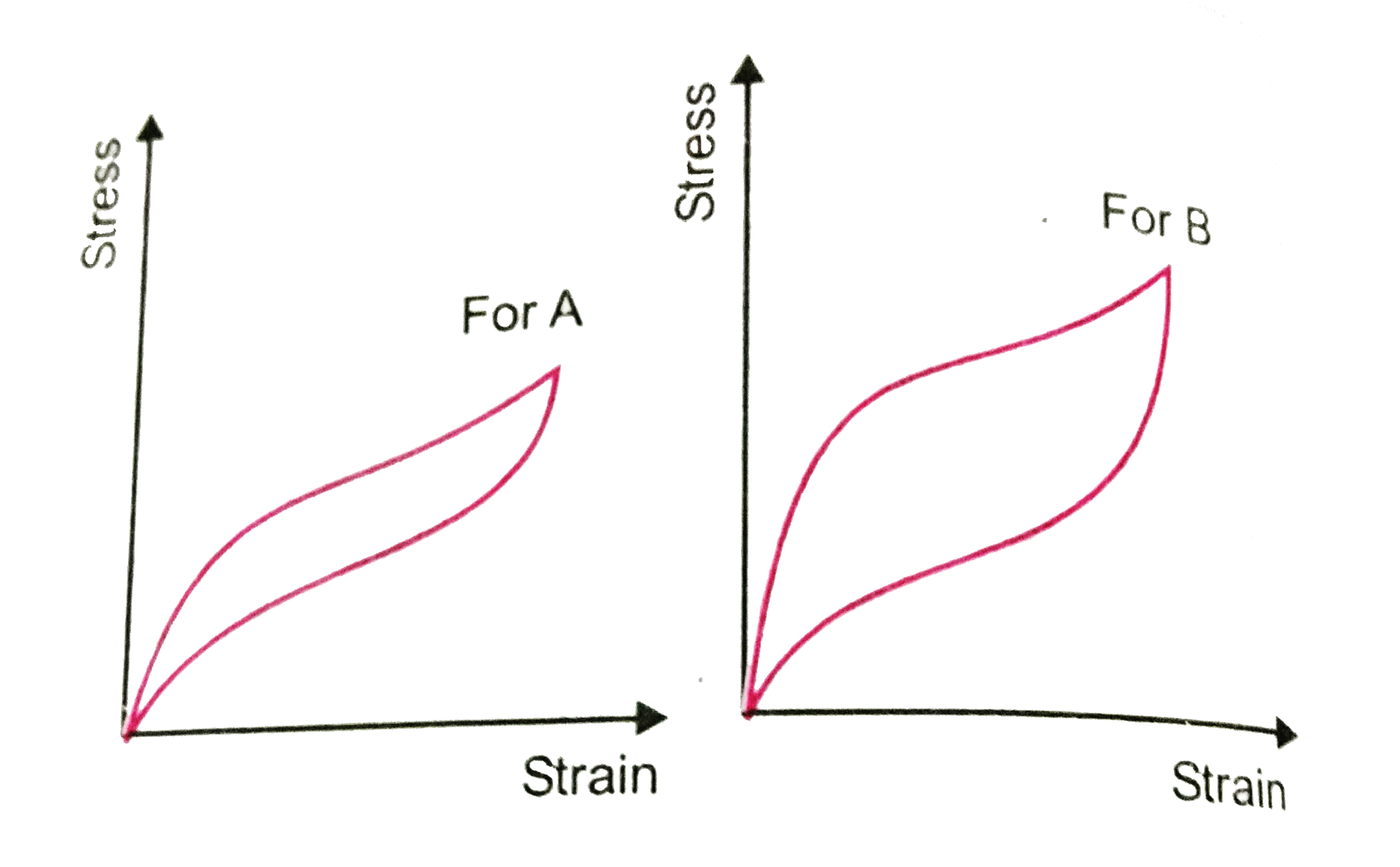
(a) In which significant ways do these curves differ form the stree-strain curve of a metal wire.
(b) A heavy machine is to be installed in a factory. To absorb vibrations of the machine, a block of rubber is placed between the machinery and the floor. which of the two rubbers A and B would you perfer to use for this purpose? why?
(c) Which of the two rubber materials would you choose for a car tyre ?
View SolutionWhy are the bridge declared unsafe after long use?
View SolutionWhy a spring balance does not give correct measurements when it has been used for a long time?
View SolutionA wire gets heated when it is bent back and forth. Why?
View SolutionTwo cylinder A and B of radii r and 2r are soldered co-axially. The free end of A is clamped and the free end of B is twisted by an angle `phi`. Find twist at the junction taking the material of tow cylinders to be same and of equal length.
View SolutionA matallic wire is stretched by suspending weight to it. If `alpha` is the longitudinal strain and Y its Young's modulus of elasticity, shown that the elastic potential energy per unit volume is given by `Y alpha^(2)//2`
View SolutionWhat is the force on a common man due to atmospheric pressure? Why one does not feel it?
View SolutionA bottle full of a liquid is fitted with a tight cork. Explain why a slight blow on the cork may be sufficient to break the bottle.
View SolutionA tank of square cross-section of each side is filled with a liquid of height h . Find the thrust experienced by the vertical surfaces and bottom surface of the tank.
View SolutionWhy is mercury perferred as a barometric substance over water?
View SolutionWhat angle will the free surface of a liquid subtend with the horizontal when the liquid in a container is moving horizontally with constat ac celeration a as shown in fig.
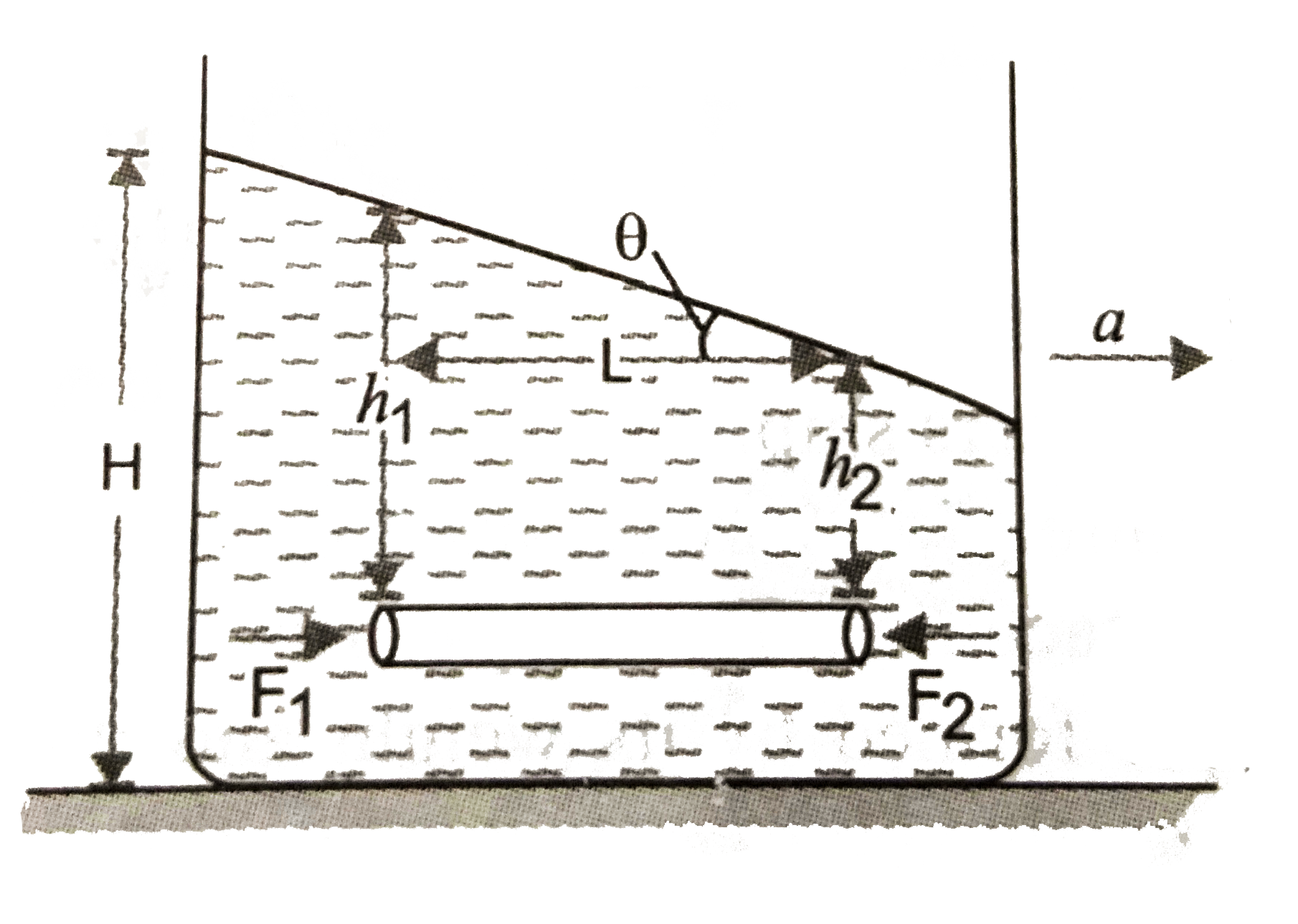
View SolutionA car is to be lifted by a hydraulic jack which consists of two pistons. The large piston is 80 cm in diameter and the smaller piston is 16 cm in diameter. If W is the weight of the car, then how much smaller force is needed on small pistonto lift the car?
View SolutionA balloon filled with helium does not rise in air indefinitely but halts after a certain height. (Neglect winds). Explain
View SolutionThe force required by a man to move his limgs immersed in water is smaller than the force for the same movement in air.
View SolutionIce floats in water with about nine tenths of its volume submerged. What is the fractional volume submerged for an ice berg floating on a fresh water lake of a (hypothetical) planet whose gravity is ten times that of the earth?
View SolutionWhat is the fractional volume of an ice cube in a pail of water produced in an enclosure which is freely falling under gravity?
View SolutionExplain why a small ireon needle sinks in water while a large iron ship floats?
View SolutionA block of wood floats in a bucket of water in a lift. Will the block sink more of less if the lift starts ac celerating up ?
View SolutionA big size balloon of mass M is held stationary in air with the help of a small block of mass `M//2` tied to it by a light string such that both float in mid air. Describe the motion of the balloon and the block when the string is cut. Support your answer with calcutations
View SolutionA man while walking is carrying a fish in the bucket full of water in the other water and thinks, he is now carrying less-weight as weight of fish will reduce due to upthrust. What do you say about it.
View SolutionWhy a sinking ship often turns over as it becomes immeresed in water?
View SolutionA piece of ice having a stone frozen in it floats in a glass vessel filled with water. How will the level of water in the vessel change when the ice melts?
View SolutionA body of density `rho` is released gently on the surface of a layer of liquid of depth d and density `rho'(rho' lt rho)` . Show that it will reach the bottom of the liquid after a time.
`[(2 d rho)/(g(rho-rho'))]^(1//2)` .
View SolutionA small ball of density `rho` is immersed in a liquid of density `sigma(gtrho)` to a depth `h` and released. The height above the surface of water up to which the ball will jump is
View SolutionA body of density `rho` floats with volume `V_(1)` of its total volume `V` immersed in a liquid of density `rho_(1)` and with the remainder of volume `V_(2)` immersed in another liquid of density `rho_(2)` where `rho_(1)gtrho_(2)`. Find the volume immersed in two liquids. (`V_(1)` and `V_(2)`).
View SolutionA razor blade can be made to float on water. What force act on this blade? Is Archimedes principle applicable?
View SolutionWhile sewing, a person often wets the end of a thread before, trying to put it through the eys of the needle. Why?
View SolutionExplain why water can be poured into a bottle with a narrow neck with the aid of glass tube?
View SolutionExplain why small drops of mercury are spherical and large drops become flat?
View SolutionA shot is obtained by pouring molten lead through narrow holes into water from certain height. The falling lead solidifies and takes the form of small spheres, Explain the phenomenon.
View SolutionExplain why some oil spread uniformly on water, when other floats as drops?
View SolutionWhy surface tension concept is only held for liquids and not for gases which are also fliuds?
View SolutionWhy an oil drop on a hot cup of soup spreads over when the temperature of the soup falls?
View SolutionA bubble having surface tension T and radius R is formed on a ring of radius b `(b lt gt R)` . Air is blown inside the tube held in front of the ring , with velocity `upsilon` as shown in fig. The air molecules collides perpendicularly with the wall of the bubble and stops. Calculate the radius R at which the bubble and stops. Calculate the radius R at which the bubble separates from the ring.
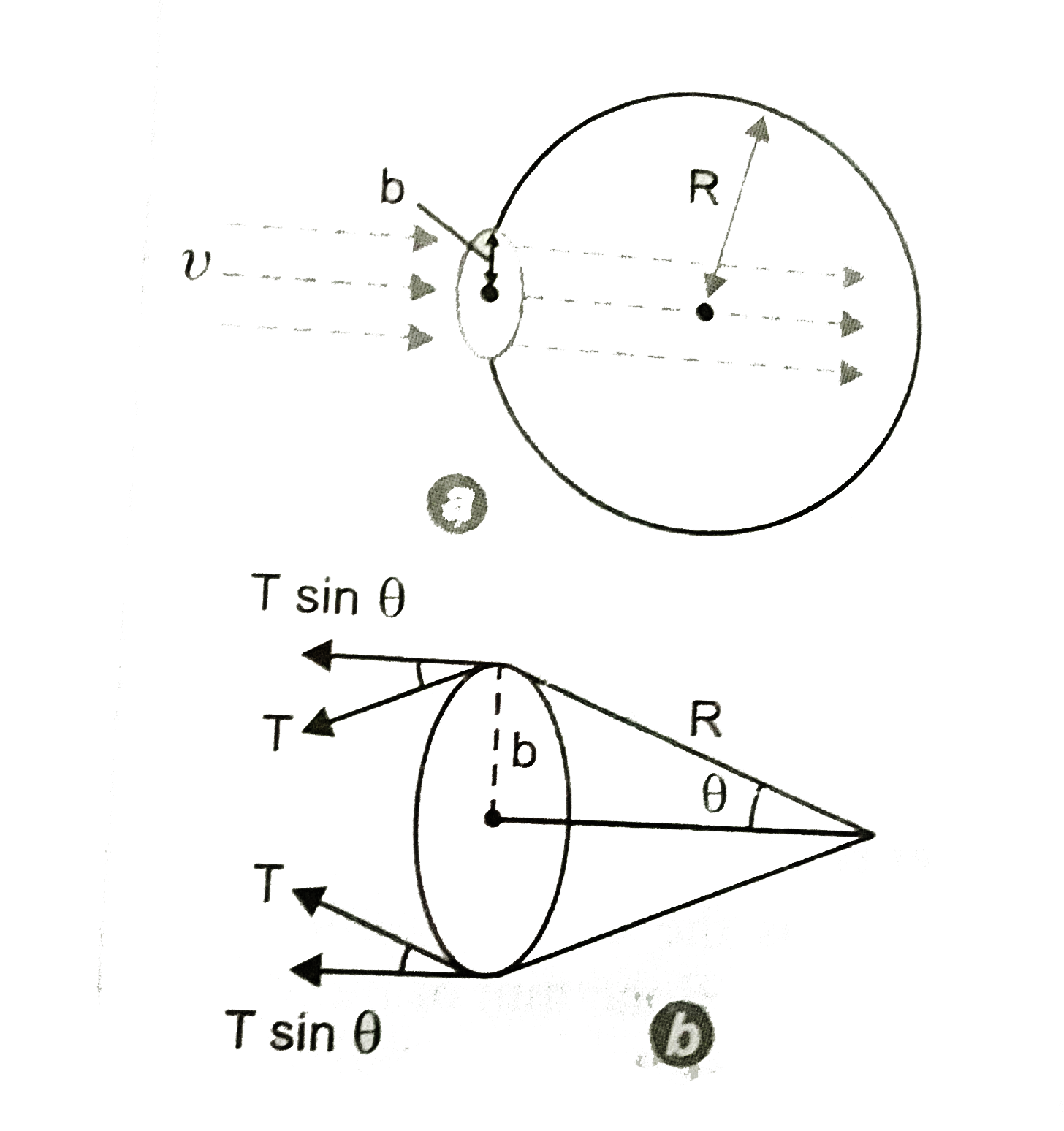
View SolutionWhy undergarments are usually made of cotton?
View SolutionWater is depressed in a glass tube whose inner surface is cotated with paraffin wax. Why?
View SolutionWhy does an iron needle float on clean water but sink when some detergent is added to this water?
View SolutionWhen one end of a tube of radius r is immersed vertically in a liquid of density `rho`, surface tension S, the rise of liquid in the tube is h and angle of contact is `theta` . If the tube is broken and its length is made `h' (lt h)`, then find the value of height of rise of liquid in the tube and angle of contact.
View SolutionIt is better to wash the clothes in hot soap solution. Why?
View SolutionIf a capillary tube is put in water in a weightlessness state, how will the rise of water in a capillary tube will be observed as compared to one under normal condition?
View SolutionWhat is the reason that a constant driving force is always required for the maintenance of the flow of oil through the pipe lines in the oil refineries?
View SolutionWater flows faster than honey. Why?
View SolutionFrom where viscous force come about in moving liquids. Discuss the factors on which viscous drag of liquid depends.
View SolutionMachine parts are jammed in winter. Why?
View SolutionWhy oils of different viscosity are used in different seasons?
View SolutionDiscuss the effect of temperature on the viscosity of liquids and gases.
View SolutionExplain viscosity. Give some examples. Where is its part being played in nature?
View SolutionThe sides of a horizontal pipe carrying dirty water get dirty. Explain.
View SolutionTwo capillary tubes of equal length and inner radii 2r and 4r respectively are added in series and a liquid flows through it. If the pressure difference between the ends of the whole system is 8.5 cm of mercury, find the pressure difference between the ends of the first capillary tube.
View Solutionwhat is the origin of viscous drag on a body falling through a fluid?
View SolutionAre there some conditions for stoke's law to be obeyed. If no, explaine. If yes mention those conditions .
View SolutionWhat is terminal velocity? Discuss the factors on which it depends.
View SolutionRain drops falling under gravity do not acquire very high velocity. Why?
View SolutionUnder what conditions, the velocity of a body falling in a medium (i) increases with time (ii) becomes constant with time (iii) becomes zero with time.
View SolutionWhat are the qualities of an ideal liquid?
View SolutionWhy dies velocity increase when water flowing in broader pipe enters a narrow pipe?
View SolutionThe shapes of cars and planes are streamlined. Why?
View SolutionTwo row boats moving parallel to each other and near by, are pulled towards each other. Explain.
View SolutionAc cording to Bernoulli's theorem the pressure of water should remain uniform in a pipe of uniform radius. But actually it goes on decreasing, why is it so?
View SolutionIf a small ping pong ball is placed in a vertical jet of water or air, it will rise to a certain geight above the nozzle and will be spinning there.
View SolutionIn an emergency, the vacuum brake is used to stop , the high speed train. How does this vacuume brake work?
View SolutionA uniform pressure p is exerted on all sides of a solid cube of a meterial at temprature `t^(@)C`. By what amount should the temperature of the cube be raised in order to bring its original volume back to the value it had before the pressure was applied ? K is the bulk modulus and `alpha` is the coefficient of linear expansion of material of solid cube.
View SolutionIf I is the moment of inertial of a disc about an axis passing through its centre then find the change in moment of inertial due to small change in its moment of inertia due to small change in its temperature `Delta t`. `alpha` is the coefficient of linear expansion of disc.
View SolutionA hollow sphere and a solid sphere of equal radii and of same material are heated to raise their temperature by equal amounts. How will the change in their volume expansion be related?
View SolutionThe triple point of water is a standard fixed point in mordern thermometry. Why?
View SolutionWhy is inver used in making a clock pendulum?
View SolutionA block of wood is floating in water at `0^@ C`. The temperature of water is slowly raised from `0^@ C` to `10^@ C`. How will the precentage of volume of block above water level change with rise in temperature?
View SolutionTwo rods, one of aluminium and other made of steel, having initial lenghts `l_(1) and l_(2)` are connected together to form a singel rod of length `(l_(1)+l_(2))`. The coefficient of linear expansions for aluminium and steel are `alpha_(a)` and `alpha_(s)` respectively. If length of each rod increases by same amount when their tempertures are raised by `t^(@)C`, then find the ratio `l_(1) (l_(1)+l_(2))`.
View SolutionIs J a physical constant or a conversion factor?
View SolutionTwo bodies at different temperature `T_(1)` and `T_(2)`. If brought in thermal contact do not mecesserily settle to the mean temperature `(T_(1)+T_(2))//2`.
View SolutionThe coolant in a chemical or nuclear plant (i.e. the liquid used to prevent different parts of a plant from getting too hot) should have hight specific heat, comment?
View SolutionWhy burns from steam are more serious than those from boling water?
View SolutionHow does skating is possibel on snow?
View SolutionCan water be boiled without heating?
View SolutionWhy water is preferred to any other liquid in the hot water bottles?
View SolutionAt the triple point of water wheater the relative amounts of ice, water and vapour fixed or not. Explain.
View SolutionWhat happens if water vapour at a pressure of 0.003 atmosphere is cooled to `0^(@)C`?
View SolutionThe ice at `0^(@)C` is converted into steam at `100^(@)C` . State the isothermal changes in the process.
View SolutionWhy do electrons in insulators not contribute to its conductivity?
View SolutionAs air is a bad conductor of heat, whu do we not feel warm without clothes?
View SolutionWhy is it hotter at the same distance over the top of a fire than in front of it?
View SolutionOn a hot day, a car is left in sunlight with all the windows closed. After sometimes, it is found that air inside the car is considerably warmer than the air outside. Explain why?
View SolutionWhy felt is used for thermal insulation in preference to air?
View SolutionTwo rods A and B are of equal length. Each rod has the ends at temp `T_(1)` and `T_(2)` . What is the condition that will ensure equal rates of flow of heat through the rods A and B ?
View SolutionThree rods made of same material and having the same cross-section have been joined as shown in fig. each rod is of the same length. The left and the right ends are kept at `0^(@)C` and `90^(@)C` respectively. What will be the temperature of the junction of the three rods?
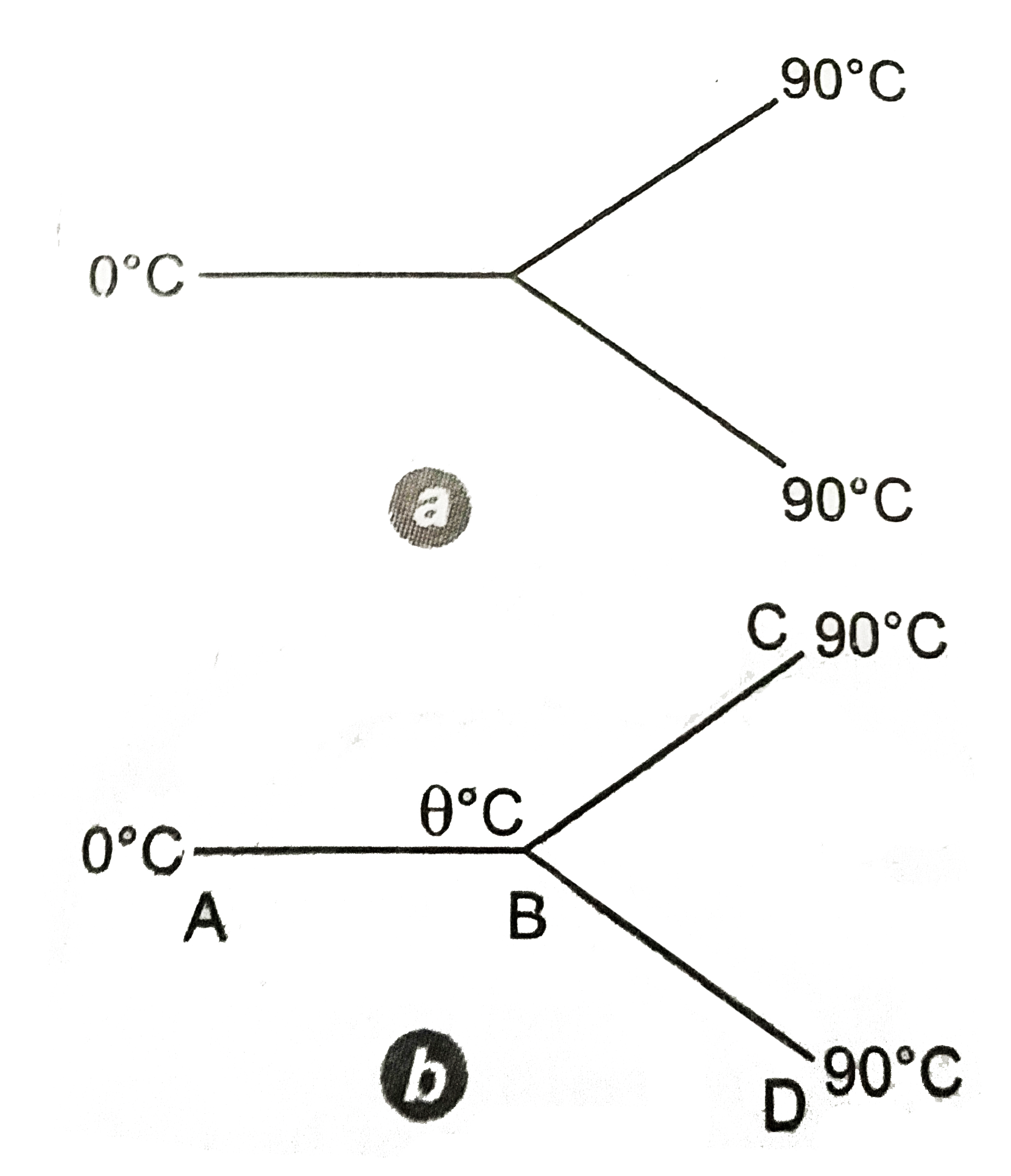
View SolutionThe temperature of the two outer surfaces of a composite slab, consisting of two materials having coefficients of thermal conductivity K and 2K and thickness x and 4x respectively. Temperatures on the opposite faces of composite slab are `T_(1) and T_(2)` where `T_(2)gtT_(1)`, as shown in fig. what is the rate of flow of heat through the slab in a steady state?
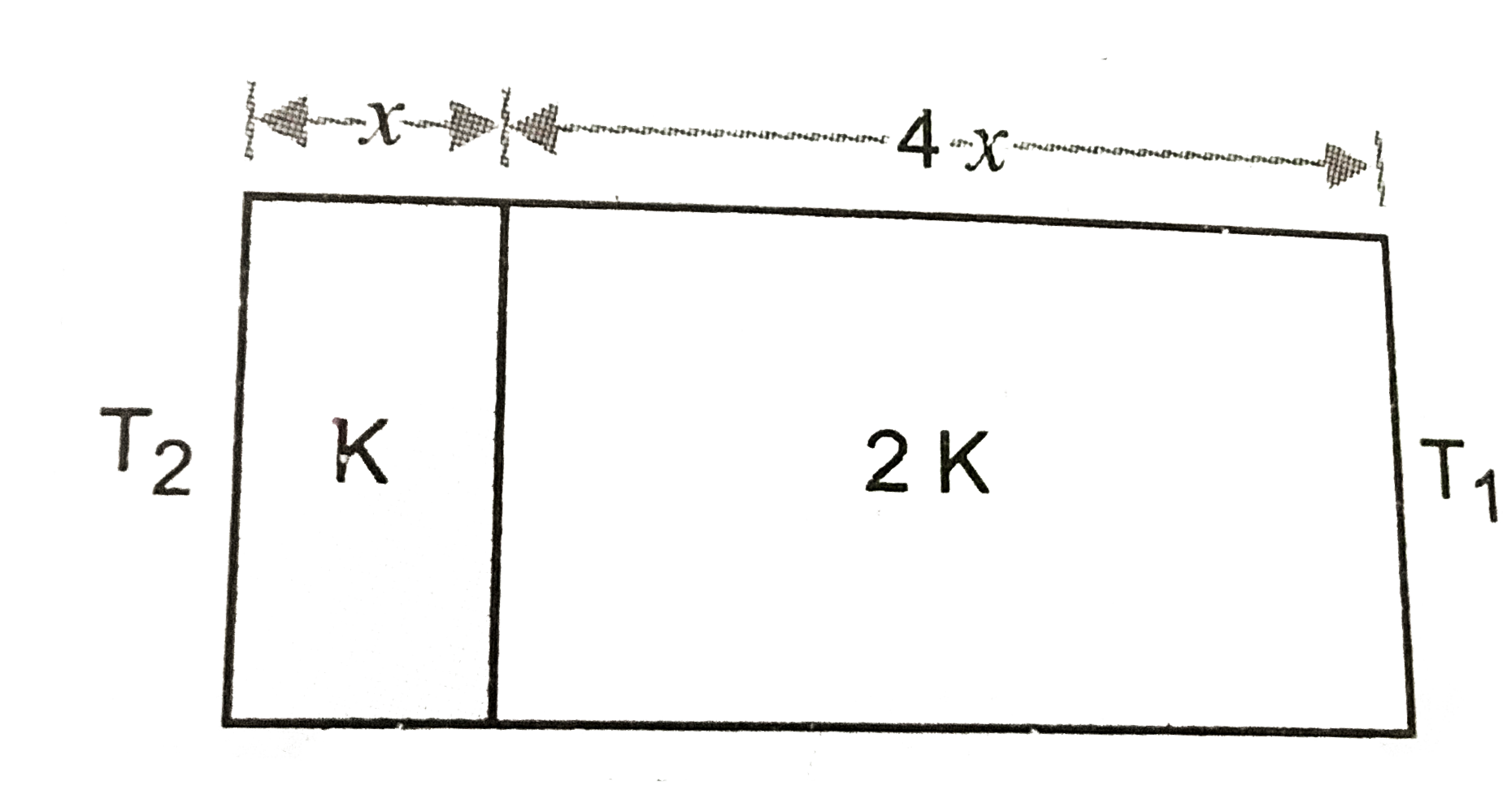
View SolutionIf a drop of water falls on a very hot iron, it does not evaporates for a long time. Give reason.
View SolutionWe cannot boil water inside the earth's satellite. Explain.
View SolutionA sphere of radius r, density,`rho` and specific heat s is heated to temperature `theta` and then cooled in an enclosure at temperature `theta_(0)` . How , the rate of fall of temperature is related with r, `rho` and s?
View SolutionThe earth constantly receives heat radiation from the sun and gets warmed up. Why does the earth not get as hot as the sun is ?
View SolutionIs it necessary that all black coloured objects should be considered black bodies ?
View Solution
Conceptual Problems questions and complete solutions for chapter PROPERTIES OF BULK MATTER of PRADEEP PHYSICS (HINGLISH) of Class 11
All Exercises from PRADEEP Class 11 PHYSICS PROPERTIES OF BULK MATTER
- Advanced problems for competitions
- Asseration - Reason Type Question
- Conceptual Problems
- Curiosity Questions
- Fill in the Blanks A
- Fill in the Blanks B
- Fill in the Blanks C
- Fill in the Blanks D
- Fill in the Blanks E
- Higher Order thinking skells
- Integer Type Questions
- Long Answer questions
- Multiple choice questions
- Multiple choice questions-I
- Multiple choice questions-II
- NCERT Questions
- Problmes for Practice
- Sample problem
- Short Answer Questions
- Solved Examples
- Test Your Grip A
- Test Your grip B
- Test Your Grip C
- Test Your Grip D
- Test Your Grip E
- Value Based Question
- Very short answer questions